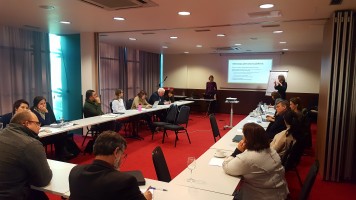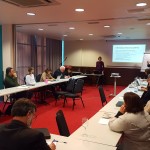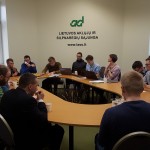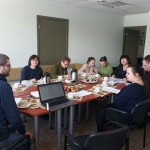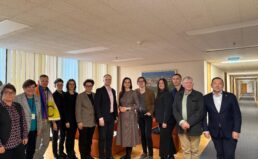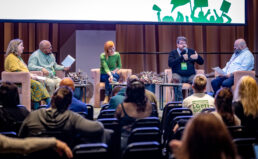From 2017, the project “Change in Business, Public Sector, Society – New Standards for Reducing Discrimination” is being implemented. One of the goals of the project is to ensure access to information for vulnerable groups: people with disabilities, the elderly, the unemployed, migrants, national minorities, LGBTI community members.
Article 9 of the United Nations Convention on the Rights of Disabled (hereinafter referred to as the “Convention”) ensures that parties ratifying the Convention seek not only physical access but also access to information for people with disabilities. Lithuania ratified the Convention in 2010, but both physical and informational access to people with different disabilities is still an aspiration. In 2016, the European Union adopted a directive of Parliament and of the Council (hereinafter referred to as “the Directive”) on the accessibility of websites and mobile applications of public sector institutions. This document is intended to support the use of the information space. According to the directive, all EU Member States must provide information to publicly accessible websites and mobile applications of public authorities in accessible and comprehensible formats for people from socially disadvantaged groups. In order to improve the availability of information for people belonging to vulnerable groups of the public, recommendations (standard of information provision) for public information providers will be prepared during the project. To achieve this, experts in the field are being used – it is the same people with disabilities and disability organizations. In order to reflect the needs of people with different disabilities, discussions are organized in which target groups express their experience using public information sites and provide expectations and advice on how to apply them and what information is most relevant.
In Lithuania, the Ministry of Transport of the Republic of Lithuania was responsible for the implementation of the Directive, therefore, on July 14, 2017, the first meeting was held with representatives of the said ministry – Head of Information Society Policy Department Petras Jakavonis and Head of Division Aušra Kumetaitienė. Article 4 of the Directive provides for public sector bodies to take the necessary steps to make their websites and mobile applications more accessible. Proper implementation of the directive would ensure the rights of people with different disabilities to access all public services and contribute to the existing obligations under the UN Convention on the Rights of Disabled. The transposition of the provisions of the Directive into national law is foreseen already in September 2018. Although the requirements of the Directive are minimal, but they are binding. Currently, the Ministry of Transport of the Republic is preparing documents accompanying the directive, technical specifications, deciding which applications are considered minimal and which ones are maximum. During the meeting, it was agreed to cooperate with representatives of the Ministry in making decisions related to the transposition of the Directive in Lithuania.
To find out the different needs of people with different disabilities, a discussion with different organizations of disability was organized on November 27, 2017.
The purpose of this discussion is to find out the needs of people with various disabilities in obtaining and using information. In order for people to make decisions and fulfil their obligations (for example, to pay taxes), they must first receive and understand provided public. Heads of disability non-governmental organizations who discussed the needs of each group for obtaining information attended the meeting. Since the European Commission is guided by the principle of “burdensome burdens”, the unanimous and clear need for the community of the disabled is important. The needs of the disabled community will be streamlined during meetings with different ministries.
One of the most common problems with the visual accessibility of information facing groups is people with visual impairments, so the second meeting was organized on January 24, 2018, at the Union of the Blind (LASS). The purpose of the meeting was to find out what obstacles the members of this community are facing in order to get public information online. The meeting was attended by students and teachers from the Lithuanian Centre of the Blind, Kaunas Pranas Daunis Education Centre, programmers from the Lithuanian Blind Library and representatives of non-governmental organizations. The head of LASS, Sigitas Armonas, noted that the application of the information is a very long procedure. If information relevant to a person is considered a priority, why cannot publicly funded pages at this time be used blindly? Is it really enough to adjust the contrast and increase the text font? It is important for blind people to be able to read graphic material, but many sites use visual material, that is not presented with a screen reader. Audio-visual is required. The community needs expressed during this meeting will also be reflected in the recommendations made to public information providers.
On February 21, 2018, a meeting was held with representatives of the Deaf Association of Lithuania, Vilnius Deaf Rehabilitation Centre, Vilnius Deaf Sports Club “Gestas” and other members of the Deaf community. The purpose of this meeting was to find out what the needs of the deaf are in adapting their public sector websites, i.e. various services, websites of public institutions.
During the meeting, deaf people expressed their opinion that it is important for them that the more websites would be translated into the language of the deaf speakers – sign language. Although everyone realized that, it was not possible to expect the full application of all websites to be available in the near future. It was highlighted that the priority should be given to various gesture instructions: explanations of how to use Internet self-service systems, as well as instructions on how to use the website: introductory video explanations, in which the site structure, the content of the sections would be told. There were also discussions about simplified versions of various texts: the use of “easy reading”, which is useful not only to the deaf, but also to seniors or mentally disabled people.
It’s important for deaf people that a variety of video-related content (video reports, interviews, video news) is always titrated, and subtitles would be customized for the deaf (with background sound descriptions, in different colours), as well as – clearly visible for seniors to read it, and deaf ones who have vision problems.
On February 22, 2018, a meeting was held with the representatives of the Lithuanian people with intellectual disabilities custody association “Viltis”, representing the interests of people with intellectual disabilities.
Dana Migaliova, head of the Lithuanian people with intellectual disabilities custody association, said that information should be developed and presented in an easily understandable language format, also emphasizing that this adaptation would be relevant not only to people with mental disabilities. At present, information in Lithuania is sufficiently clear only at airports and malls. Information is not available for people who are illiterate, disabled or those who need alternative communication tools. It was suggested that information should be divided into two stages: easy-to-read (general current information) and the minimum information each person needs to know, presented in a comprehensible format with pictures. With such an adaptation, a person with intellectual disabilities himself could decide on the level of adaptation he needs. Access to information should be guaranteed in the same way as, for example, state-guaranteed legal aid.
The article is published under the framework of the project “Change in Private, Public and Civic Sectors – New Standards for Reducing Discrimination” No. 07. 3. 4-ESFA-V-426-01-0001. The project is implemented under the framework of the Operational Programme for EU Structural Funds Investments for 2014-2020 based on the decition by the European Commission of 8 September, 2014 Nr. C (2014) 6397, priority No. 7 “Promoting of Quality Employment and Participation in the Labor Market” No. 07.3.4-ESFA-V-426, implementation measure “Reducing Discrimination”. The project is implemented by the Equal Opportunities Ombudsperson’s Office of the Republic of Lithuania and partners: Human Rights Monitoring Institute and the National LGBT* rights organization LGL.


